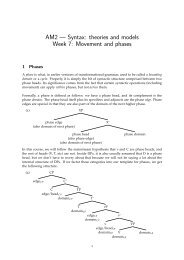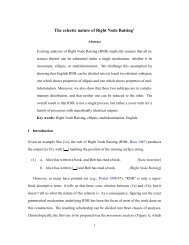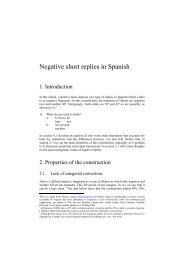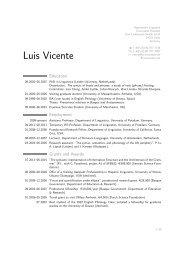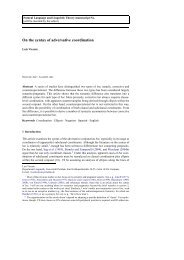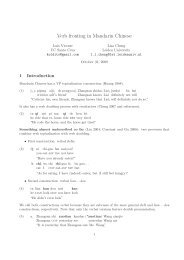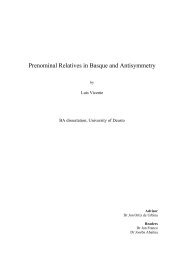Negative answer fragments in Spanish - Luis Vicente
Negative answer fragments in Spanish - Luis Vicente
Negative answer fragments in Spanish - Luis Vicente
Create successful ePaper yourself
Turn your PDF publications into a flip-book with our unique Google optimized e-Paper software.
¤¥¦ § ¨© §¢ ¡¡¢£ TINDAG 2006 12TINDAG 20061 Intro<strong>Negative</strong> <strong>answer</strong> <strong>fragments</strong> <strong>in</strong> <strong>Spanish</strong> <strong>Luis</strong> <strong>Vicente</strong>, Leiden Universitykoldito@gmail.comThis is the type of sentences I’ll be deal<strong>in</strong>g with:1) ¿Con quién fuiste al c<strong>in</strong>e?with whom went.2SG to the movies?a. Con María no [XP no]with M notb. No con María [no XP]not with M2 Basic propertiesa) explore the properties of XP no and no XP orders.b) sketch a basic analysis.c) mention some pend<strong>in</strong>g questions and problems.2.1 Categorial unrestrictivenessAny category can be a remnant XP <strong>in</strong> a negative <strong>fragments</strong> (though some are more felicitousthat others). This <strong>in</strong>cludes DPs (also bare nouns), PPs, adjectives, adverbs, <strong>in</strong>f<strong>in</strong>itivalcomplements, and full f<strong>in</strong>ite CPs.2) What have you been read<strong>in</strong>g?a. Una novela de terror noa novel of terror notb. No una novela de terrornot a novel of terror3) What are you go<strong>in</strong>g to write your thesis about?a. Sobre la concordancia noabout the agreement notThanks to: Kyle Johnson and Carol<strong>in</strong>e Heycock for <strong>in</strong>spiration and early guidance; Anikó Lipták and LisaCheng for later guidance; Carmen Martínez for help with some judgements; Raquel González and Carlos Buesafor supply<strong>in</strong>g me with some hard-to-get literature; and the Basque Government for f<strong>in</strong>ancial support.b. No sobre la concordancianot about the agreement4) In what state did you f<strong>in</strong>d the mar<strong>in</strong>ers?a. Sobrios nosober notb. No sobriosnot sober5) How often do you go to the gym? 1a. Frecuentemente nooften notb. No frecuentementenot often6) What household task do you hate most?a. Hacer la cama nomake the bed notb. No hacer la cama 2not make the bed7) What did Jesus preach to the people of Judea?a. Que adoraran al diablo nothat worship.3PL the devil notb. No que adoraran al diablonot that worship.3PL the devil2.2 Connectivity effectsAnaphors are possible <strong>in</strong> negative replies, which suggests that they conta<strong>in</strong> a hiddenrepresentation of the b<strong>in</strong>der (argument adopted from Morgan 1973 and Merchant 2004).8) ¿De quién habla Juan i todo el rato?about who talks J all the timea. De sí mismo i noabout himself notb. No de sí mismo <strong>in</strong>ot about himself1 Speaker-oriented adverbs can’t appear <strong>in</strong> the no XP order, but this is possibly due to them be<strong>in</strong>g PPIs (cf.Nilsen 2003:II and references)i) aparentemente noapparently notii) * no aparentementenot apparently2 For reasons that I do not understand, orders with <strong>in</strong>f<strong>in</strong>itival clauses strongly favour a read<strong>in</strong>g <strong>in</strong> whichnegation is part of the <strong>in</strong>f<strong>in</strong>itival, rather than external to it (i.e.,, ratherthan the <strong>in</strong>tended). However, it is easy to show that the <strong>in</strong>tended read<strong>in</strong>gexists, s<strong>in</strong>ce one can stack two negations, thus mak<strong>in</strong>g one of them unambiguously external to the <strong>in</strong>f<strong>in</strong>itival(this is somewhat marg<strong>in</strong>al, possibly due to the difficulty to parse two negatives next to each other). Thus:A: What does Mary want to do over summer?B: No [no irse de vacaciones]not not go of holiday[= not go<strong>in</strong>g on holiday is not what she wants to do]
,-.+-,*+ £© ¡¡ !"# !#¢£¢ ¡$ !##/%//1023©'¦(&¥¢©)/102310231023%TINDAG 2006 34TINDAG 2006The same holds for pr<strong>in</strong>ciples B and C and for variable b<strong>in</strong>d<strong>in</strong>g.9) ¿De quién habla Juan i todo el rato?about who talks J all the timea. * De él i noabout him notb. * No de él <strong>in</strong>ot about him10) ¿De quién habla Juan i todo el rato?about who talks J all the timea. * De Juan i noabout J notb. * No de Juan <strong>in</strong>ot about J11) ¿De quién está hablando todo i hombre?about who is talk<strong>in</strong>g every mana. De su i mujer noabout his wife notb. No de su i mujernot about his wifeAccord<strong>in</strong>g to Merchant, bare <strong>fragments</strong> <strong>in</strong>volve movement plus clausal deletion.12) a. What do you want to dr<strong>in</strong>k?b. Beerc. Beer [I want to dr<strong>in</strong>k ]But this analysis is difficult to extend to negative replies because negation and the remnantdon’t form a constituent.13) a. ¿Qué quieres beber?what want.2SG dr<strong>in</strong>kb. quiero bebernot want.2SG dr<strong>in</strong>k beerSometimes (under heavy stress), it is possible to have negation and the remnant as aconstituent. Depiante (2000) proposes such an analysis.14) a. Quiero beber NO CERVEZA *(s<strong>in</strong>o v<strong>in</strong>o)want.2SG dr<strong>in</strong>k not beer but w<strong>in</strong>eb. [no cerveza] [quiero beber ]15) John has drunk a quarter not of beer, but of whiskey [McCawley 1991:193]16) a. ¿Qué equipo piensa Juan que va a ganar la liga?which team th<strong>in</strong>ks J that is go<strong>in</strong>g to w<strong>in</strong> the championshipb. Me parece que no el Madridme.DAT seems that not the M[= it seems to me that he doesn’t th<strong>in</strong>k that Real Madrid is go<strong>in</strong>g to w<strong>in</strong>]17) a. ¿Qué paises ha mencionado Juan que quiere visitar?which countries has mentioned J that wants visitb. Un montón, pero no Sueciaa lot of them but not Sweden[= he didn’t mention that he wants to visit Sweden]18) When we asked her, Beth said she wanted to take French, but not <strong>Spanish</strong>[= she didn’t say she wanted to take <strong>Spanish</strong>]3 The positions of the remnants3.1 Presupposition effects[] orders create an existential presupposition, but [] orders don’t19) What did you dr<strong>in</strong>k at the party?a. Cerveza no De hecho, no bebí nadabeer not As a matter of fact, I didn’t dr<strong>in</strong>k anyth<strong>in</strong>gb. No cerveza # De hecho, no bebí nadanot beer As a matter of fact, I didn’t dr<strong>in</strong>k anyth<strong>in</strong>g20) Who did you go to the movies with?a. Con Susana no. De hecho, fuí solowith S not As a matter of fact, I went on my ownb. No con Susana # De hecho, fuí solonot with S As a matter of fact, I went on my ownThe same effect arises <strong>in</strong> regular sentences with focused constituents, but not undertopicalisation.21) a. No he leídoDe hecho, no he leido nadanot have read 1984 As a matter of fact, I haven’t read anyth<strong>in</strong>gb. , no lo he leido De hecho, no he leido nada1984 not CL have read As a matter of fact, I haven’t read anyth<strong>in</strong>gc. No he leido [ FOC ] # De hecho, no he leido nadanot have read 1984 As a matter of fact, I haven’t read anyth<strong>in</strong>gd. [ FOC ] no he leido # De hecho, no he leido nada1984 not have read As a matter of fact, I haven’t read anyth<strong>in</strong>gDitto for pseudoclefts, which also <strong>in</strong>volve a focus structure.Though this analysis is falsified by examples like the follow<strong>in</strong>g, where negation and theremnant orig<strong>in</strong>ate <strong>in</strong> different clauses (example 18 from Merchant 2003).
-, +.441023-, +.1023,-.+,-.+,-.+¥£,-.+P..KRS %M%NKO PN LK JK I5WV!' X¥"WV\[# Y¥'ZPTKOKN\[;
-],-.+%_ P. %^S%_ P. %^S%_ P. %^S%_ P. %^S%78na/na-, +.aaQ.S`Q.S`aaQ.S`Q.S`Q.S`aaQ.S`Q.S`aaQ.S`Q.S`aaQ.S`Q.S`aaQ.S`Q.S`B7j / *many notb. No muchos [* > /not many36) How many books have you read?a. Muchos no, pero muchos sí [valid statement]many not but many yesb. # No muchos, pero muchos sí [contradiction, s<strong>in</strong>ce [not many but many yes>>]]>] =]31) a. What do you want to dr<strong>in</strong>k?b. Cerveza nobeer not“… negative predicates require a restrictive context… ” [Erteschik-Shir 1998:III]32) a. What did Joan do last night?b. She didn’ t go to the movies(# unless there is some previously established set of th<strong>in</strong>gs she might have done,and that <strong>in</strong>cludes go<strong>in</strong>g to the movies)In all of the examples, the remnant XP seems to be <strong>in</strong>cluded <strong>in</strong> the set of common discoursereferents, so one can <strong>answer</strong> the question be referr<strong>in</strong>g back to an exist<strong>in</strong>g topic. Evenexamples like (1)/(31) can’ t be uttered out of the blue (i.e., <strong>in</strong> a transaction sett<strong>in</strong>g).Topicalisation and focalisation (whether front<strong>in</strong>g or <strong>in</strong> situ) also derive the wide scoperead<strong>in</strong>g of , which is impossible under a neutral <strong>in</strong>terpretation of the sentence.37) a. No he leido muchos libros [*not have read many booksb. Muchos libros, no los he leido [many books not CL have readc. No he leido MUCHOS LIBROS [not have read many booksd. MUCHOS LIBROS no he leido [many books not have readThese contrasts seem to support an analysis <strong>in</strong> which negation is base generated high. If it was> ] read<strong>in</strong>g <strong>in</strong> (37)b/(37)d?fg8 >7>>>// *?/ */ *>>>>]]]]33) (at the ticket booth <strong>in</strong> a theatre)Booth person: Which film do you want tickets for?Movie-goer: # Paranofor M P not# No paranot for M PJ-+J-+34) (between fellow movie-goers)MG#1: Tonight they are show<strong>in</strong>g Match Po<strong>in</strong>t and Broken Flowers. Which one do youwant to watch?MG#2noM P notNonot M PJ-+MKcJ-+>9 d AA>e
aannaann%aann y ru zwxq r s t u r vpa nu~ r }u | r {r rq~u ux ~ w r} €x xq ƒ r…q ru~ r ~x†ƒ „ …~ qx …u~‚‡xxq rr~ ~~ x …ˆp{ ‹Š‰xu ƒ u ……uq xqu qx‚ ƒ „ˆo …Œ{ ‰z†xu x~¥¦©" u r~ ƒ{q q u rqr ~ p4¥¦©"Q”•–—–šŽ‘’“QTINDAG 2006 910TINDAG 2006b. Para sacarse el título, no debe coger más clasesso as to receive the degree not must take more courses[ > / ? > ]Interest<strong>in</strong>gly, both read<strong>in</strong>gs are also available <strong>in</strong> negative <strong>fragments</strong>40) a. ¿Qué tipo de ropa debe llevar Juan en su boda ?what k<strong>in</strong>d of garments must wear J at his wedd<strong>in</strong>gb. Corbata notie not[ > / > ]41) a. Para que le den la beca…so as to get the scholarship…¿Sobre qué tema debe decir Juan que trata su tesis?about what topic must say J that deals his thesisb. No sobre los participiosnot about the participles[ > / > ]Note that (41)b can have a read<strong>in</strong>g <strong>in</strong> which negation and the remnant XP come from differentclauses. S<strong>in</strong>ce the [ > ] read<strong>in</strong>g is possible, it must be the case that negation is structurallylower than the modal at some po<strong>in</strong>t. But, <strong>in</strong> pr<strong>in</strong>ciple, this is <strong>in</strong>compatible with theconclusions of the previous section.5 Stand<strong>in</strong>g questions, part II: constituent negation42) a. Dijiste que ibas a ir al c<strong>in</strong>e con María, (y) no con Susanasaid.2SG that were go<strong>in</strong>g to the movies with M and not with S[ you didn’ t say that you were go<strong>in</strong>g with Susana]b. Dijiste que ibas a ir al c<strong>in</strong>e con María,said.2SG that were go<strong>in</strong>g to the movies with Mno con Susanabut not with S[= you didn’ t say that you were go<strong>in</strong>g with Susana]43) a. * Dijiste que ibas a ir al c<strong>in</strong>e con María, (y) con Susana nosaid.2SG that were go<strong>in</strong>g to the movies with M and with S notb. Dijiste que ibas a ir al c<strong>in</strong>e con María,said.2SG that were go<strong>in</strong>g to the movies with Mcon Susana nobut with S noSo, it seems that the use of ‘but’ licenses a derivation as <strong>in</strong> (28)c, and that its absence (orNKO+the presence of ‘and’ ) requires a Depiante-style analysis (14)b.In constituent negation cases (Ø/ ), the fragment can be “extraposed” (this requires focalaccent on the correlate).44) Juan ha ido AL CINE con María, (y) no al teatroJ has gone to the movies with M and not to the theatreBut if this was movement, it would amount to a CSC violation, so maybe <strong>in</strong> this case there isa second ellipsis operation45) Juan ha ido [[AL CINE con María], (y) [no al teatro con María]]J has gone to the movies with M and not to the theatre with MBut, then, with more complicated examples, there would also have to be movement with<strong>in</strong> thenegative fragment, which would entail that constituent negation may also be given an ellipsisanalysis46) [[AL CINE ha dicho Juan que ha ido con María]to the movies has said J that has gone with M[(y) no al teatro [ha dicho Juan que ha ido con María]]]and not to the theatre has said J that has gone with M6 ReferencesBosque, Ignacio (1984), “Negación y elipsis”,Brucart, José (1987),, Bellaterra, Barcelona.Brucart, José (1999), “La elipsis”, <strong>in</strong> Bosque & Demonte (eds.),Espasa-Calpe, Madrid.Depiante, Marcela (2000),, PhD dissertation, University of Connecticut.Depiante, Marcela (2001), “Ellipsis <strong>in</strong> <strong>Spanish</strong> and the Stray Affix Filter”,Erteschik-Shir, Nomi (1998),Laka, Itziar (1990),, PhD dissertation, MIT, Oxford University Press, Oxford.McCawley, James (1991), “Metal<strong>in</strong>guistic negation and contrastive negation”,.Merchant, Jason (2003), “Remarks on stripp<strong>in</strong>g”, ms., University of Chicago.Merchant, Jason (2004), “Fragments and ellipsis”,Morgan, Jerry (1973), “Sentence <strong>fragments</strong> and the notion of ‘sentence’ ”, <strong>in</strong> Kachru et al (eds.),, University of Ill<strong>in</strong>ois Press, Urbana-Champaign.Nilsen, Øyste<strong>in</strong> (2003),, PhD dissertation, University of Utrecht.., 171-199.<strong>Luis</strong> <strong>Vicente</strong>Leiden University Centre for L<strong>in</strong>guisticsP.O. Box 95152300 RA Leiden’˜http://www.luisvicente.net



